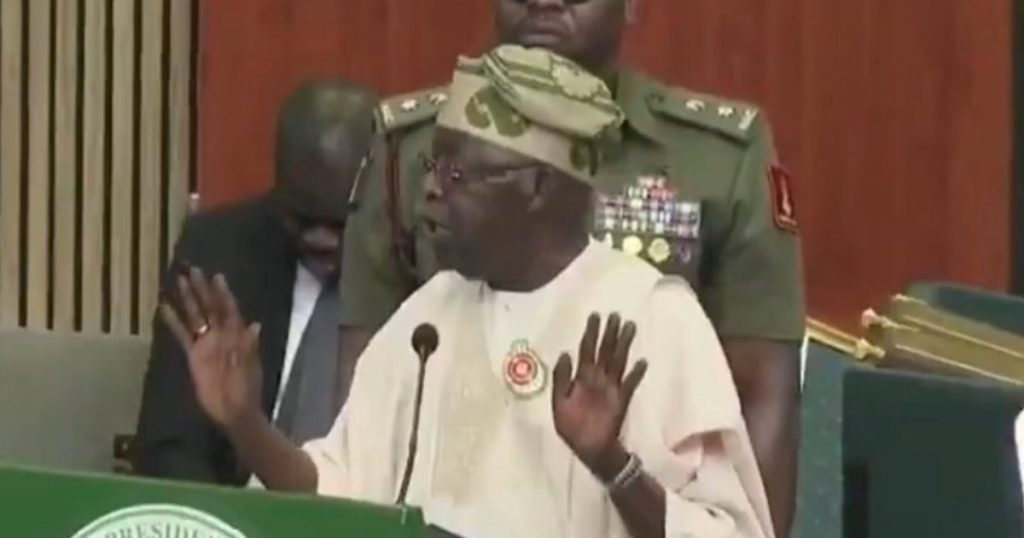President Bola Tinubu’s presentation of the 2025 Appropriation Bill, titled “The Restoration Budget, securing peace, building prosperity,” to the 10th National Assembly was punctuated by a humorous yet revealing slip of the tongue. Concluding his address, the President mistakenly referred to the assembly as the 11th, a gaffe quickly pointed out by a lawmaker. Tinubu’s surprised response, “10? I wrote 11,” sparked an uproar among the legislators, which he playfully diffused by declaring, “Which means you’re all re-elected.” This lighthearted exchange, culminating in chants of support from the lawmakers – “On your mandate we shall stand, Bola!” – underscored the political dynamics at play and perhaps hinted at the President’s own aspirations for the future composition of the legislative body. However, the seemingly minor incident also raised questions about the level of detailed preparation and awareness the President had going into such a significant presentation.
The core of Tinubu’s presentation revolved around the proposed allocation of funds for key sectors in the 2025 fiscal year. A significant portion, N4.91 trillion, was earmarked for defence and security, reflecting the ongoing challenges posed by insecurity across the nation. This substantial allocation underscores the government’s prioritization of addressing these issues and restoring peace, a key element of the budget’s overarching theme of “Restoration.” It signals a commitment to strengthening security forces, enhancing intelligence capabilities, and implementing strategies to combat various forms of insecurity, including terrorism, banditry, and communal clashes. The significant financial commitment suggests a recognition of the urgency and importance of these security concerns.
Infrastructure development also received a considerable allocation of N4.06 trillion. This investment reflects the government’s focus on improving critical infrastructure across the country, including roads, bridges, power, and transportation networks. Such development is considered crucial for boosting economic growth, attracting foreign investment, and improving the overall quality of life for citizens. Improved infrastructure can facilitate trade, create jobs, and connect communities, contributing to the “building prosperity” aspect of the budget’s title. The substantial investment in infrastructure suggests a belief in its transformative potential for the Nigerian economy.
Furthermore, the health sector received a proposed allocation of N2.48 trillion. This investment aims to enhance healthcare delivery, improve access to quality medical services, and address critical health challenges facing the nation. The allocation could potentially focus on strengthening primary healthcare systems, upgrading hospital facilities, combating infectious diseases, and improving maternal and child health outcomes. The budget’s emphasis on health reflects a recognition of its fundamental importance in human development and its contribution to a productive and prosperous society.
Education, another crucial sector, was earmarked to receive N3.5 trillion. This allocation aims to enhance educational quality at all levels, from primary to tertiary education. The funds could be channeled towards improving teacher training, developing curriculum, providing educational resources, and expanding access to quality education for all children. Investing in education is seen as a vital strategy for developing human capital, empowering individuals, and fostering innovation, ultimately contributing to the long-term economic and social development of the nation.
The “Restoration Budget” presented by President Tinubu thus focuses on four key pillars: security, infrastructure, health, and education. These prioritized sectors reflect the government’s commitment to addressing critical challenges facing the country and laying the foundation for sustainable development. The significant financial allocations suggest a determination to translate these priorities into tangible actions and measurable outcomes. However, the success of the budget will depend on effective implementation, transparency in fund management, and accountability in ensuring that the allocated resources reach their intended beneficiaries and achieve the desired impact.
Finally, the President’s slip-up regarding the Assembly’s numbering, while seemingly trivial, offered a glimpse into the political undercurrents at play. While easily dismissed as a simple mistake, it also invited speculation about the President’s forward-thinking approach and perhaps a desire to influence the future political landscape. The lawmakers’ enthusiastic response further fueled this speculation, suggesting a close alignment between the executive and legislative branches and a potential foreshadowing of political maneuvering in the upcoming electoral cycle. Regardless of intent, the incident injected a moment of levity into a serious proceeding, momentarily diverting attention from the weighty matters of budgetary allocations and national priorities.














